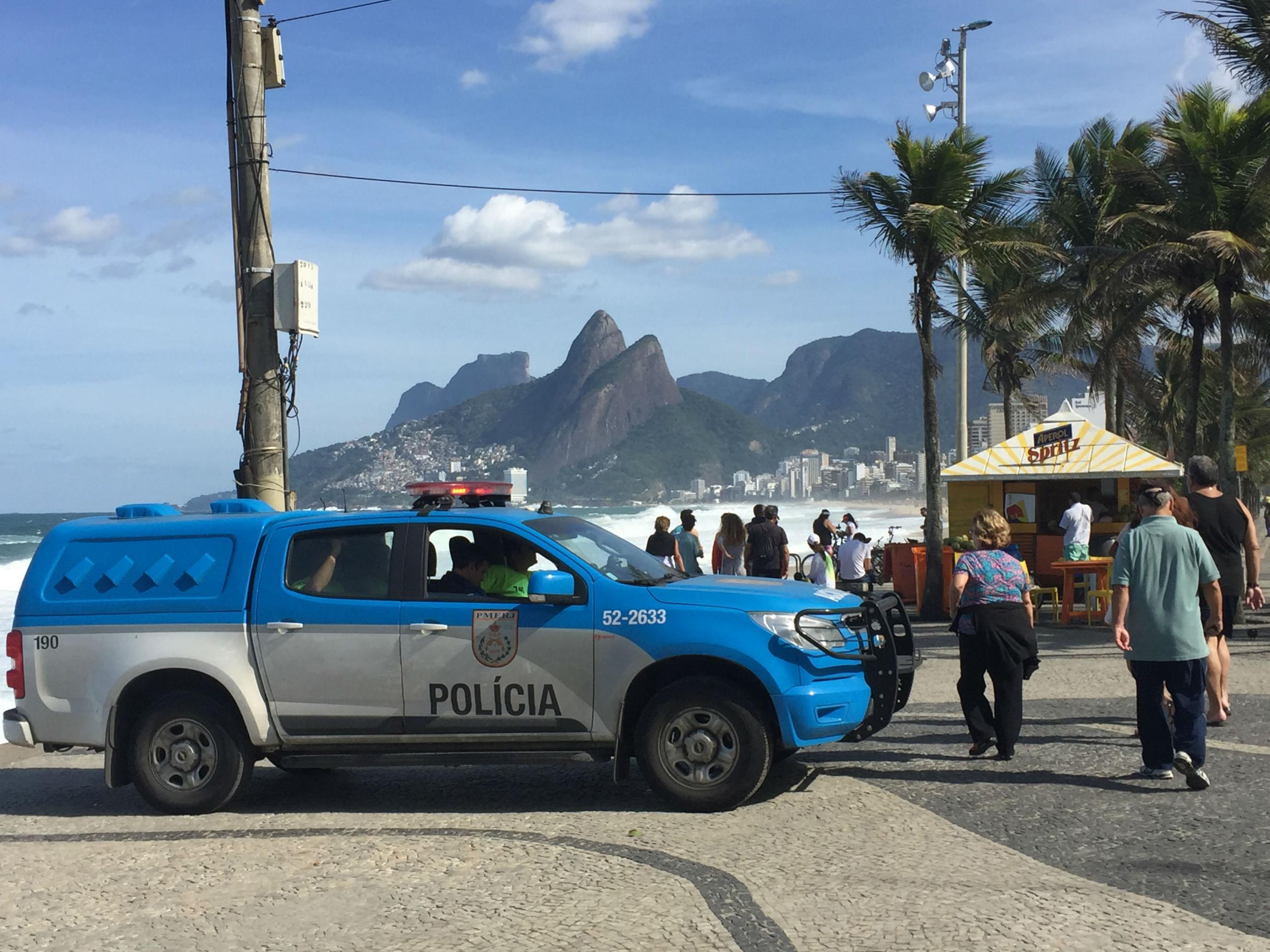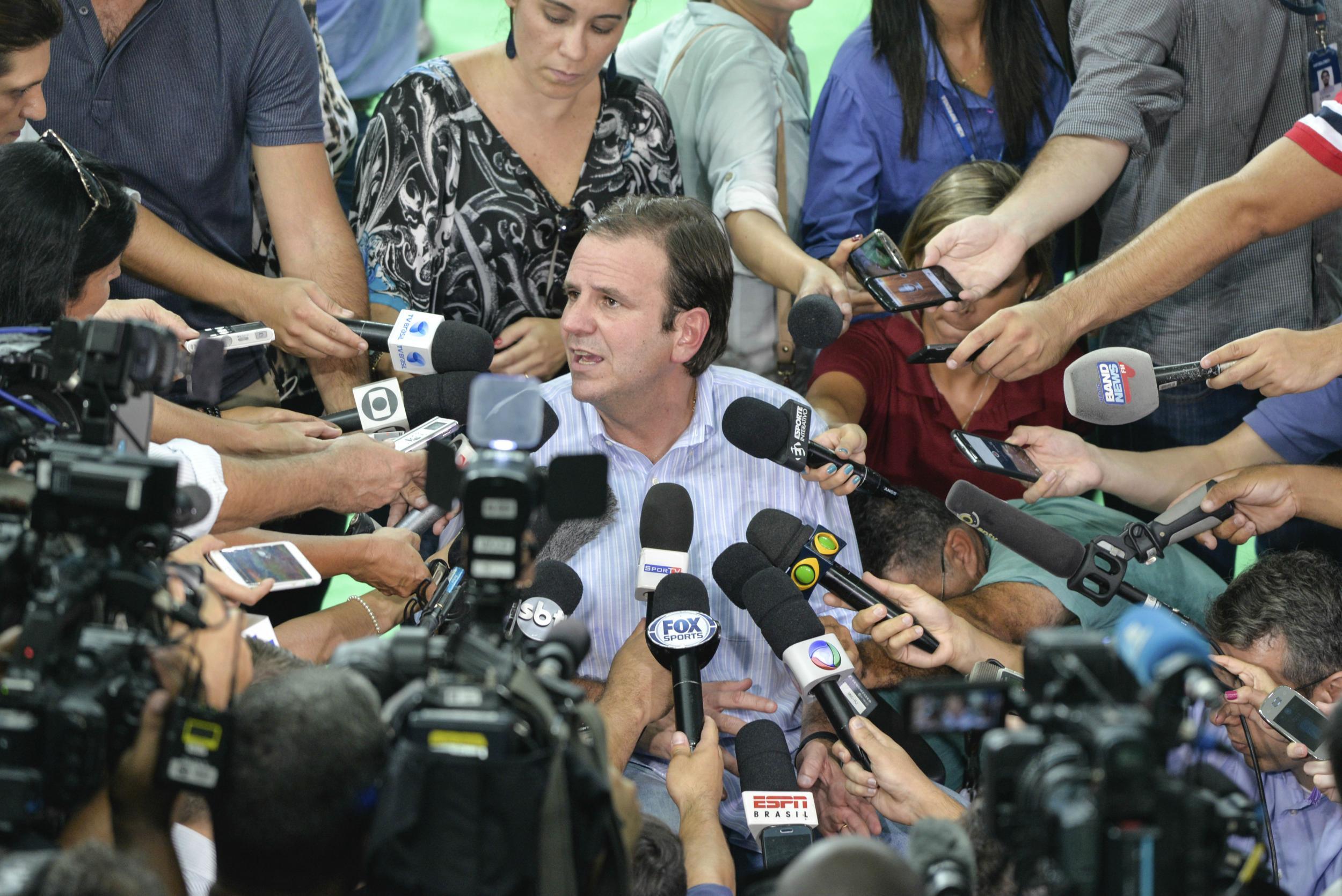Never mind Zika, superbugs and sewage, Rio Olympics on track to eclipse London 2012 says defiant mayor
Exclusive: Mayor of Rio de Janeiro says he felt "at war" in London, security in Rio will be massive but less oppressive

Your support helps us to tell the story
From reproductive rights to climate change to Big Tech, The Independent is on the ground when the story is developing. Whether it's investigating the financials of Elon Musk's pro-Trump PAC or producing our latest documentary, 'The A Word', which shines a light on the American women fighting for reproductive rights, we know how important it is to parse out the facts from the messaging.
At such a critical moment in US history, we need reporters on the ground. Your donation allows us to keep sending journalists to speak to both sides of the story.
The Independent is trusted by Americans across the entire political spectrum. And unlike many other quality news outlets, we choose not to lock Americans out of our reporting and analysis with paywalls. We believe quality journalism should be available to everyone, paid for by those who can afford it.
Your support makes all the difference.Rio de Janeiro will be swarming with soldiers and military police through the Olympic Games in part because of terror threats being imported by participating nations like Britain and the United States that have nothing to do with Brazil, the city’s top elected official has claimed.
“Brazil is not a country that used to colonise countries, we don’t invade countries we don’t put our noses into other peoples lives,” Eduardo Paes, the Mayor of Rio de Janeiro, told The Independent, adding that MI6, the CIA and the FBI are all talking with Brazil on security preparations. “The country has a history dealing well with these things. It is not a country that is a target for terrorists.”
In a wide-ranging interview which saw him defensively dismissing many of the concerns now been raised in connection to the Games - from polluted water at competition sites to the Zika virus - Mr Paes also made frequent jabs at the 2012 London Olympics, noting the high cost of some of its venues and the long delay in finding long-term tenants for the main London stadium.
“Your Olympic Park has not been open yet in four years. The last time it was used was by me, carrying the flag!” Mr Paes claimed with a not-quite-accurate grasp of the London legacy. He also boasted that Rio will end up spending roughly the same amount of public money - about £1.4bn - to build all its facilities for these Games as Britain did on building its signature stadium alone.
In reality, the blanket security operation - about 80,000 soldiers will be drafted in for the Games - is primarily a response to a spike in violent crime, fuelled by gangs and drug battles in the slums, or favelas, as well as growing economic deprivation, some of which has spilled into tourist areas. Last month a Spanish sailing gold medalist was robbed at gunpoint in the popular Santa Teresa district.
“The biggest problem of our city is crime rates…every time Rio holds big events there is going to be a bunch of police and army and everything on the streets,” the mayor conceded. “It will be safe. Unfortunately I don't think it will be safe after the Games.” Yet, it will still be less oppressive than London four years ago, he opined, taking successive cups of strong coffee in his City Hall office.
“I mean all the army was on the streets because of terrorist threats. Security in London failed just two weeks before the (2012) Games and the army had to jump on the streets. When I got to London I thought I was at war. There was so much army everywhere.”
As the face of the 2016 Games, Mr Paes, a possible future president, is under huge pressure to deliver them successfully. He is in part dependent on the International Olympic Committee, IOC, delivering spectacular opening and closing ceremonies - he says he has not seen the plans for them - and the enthusiasm and energy that the people of Rio - Cariocas - are known for.

As of now, that enthusiasm is absent among a population that cares only about two sports, soccer and volleyball. Asked to explain the absence of Olympics-related decoration in the city - no banners or flags on the streets - Mr Paes said they are coming. “By next week we will start getting things out on the streets. We have had too much rain too much windy conditions, you know.”
He meanwhile faces growing questions from the media and international medical experts both about the Zika virus and the failure to deliver on promises made in Rio’s original bid to clean up pollution in a large Rio bay that will host sailing races and a land-locked lagoon near Ipanema Beach set aside for rowing competitions, both events that will attract intense British interest.
He blamed the state of Rio de Janeiro for the shortcomings, in part created by untreated sewage flowing into both areas. The state promised to reach 80 per cent sewage treatment related to the bay, but has reached only 60 per cent, which he called a “missed opportunity”. But last week, the Reuters news agency said it had seen two unpublished research papers showing evidence also of superbugs in the lagoon and many popular tourist beaches in part thanks to waste from hospitals.
Citing tests conducted by the city at the Lagoa Rodrigo de Freitas, Mr Paes insisted that the rowing events will face “no problems” from polluted water. Challenged by The Independent to take a swim in the lagoon, he said he would jump in with no fear for his health. “People are water-skiing there. I have no concerns.”
His purported confidence is linked in part to the seasons. The weather when the Games open on 5 August should be dry and run-off into the bay and the lagoon at a minimum. It is for the same reason that the mayor seems able similarly to brush off the Zika virus crisis which led 150 world specialists last month to plead to the World Health Organisation to move or postpone the Games.
“It is not going to be a thing for the Olympic Games,” he said, noting that the WHO itself has so far resisted any suggestion that the Zika virus warrants any changes in the Olympic schedule. Zika will be at the top of the agenda when IOC president Thomas Bach comes to Rio on a pre-Games assessment visit later this week.
“I am not a specialist so I have to trust someone. If the WHO is saying, ‘OK, we have the appeal of the 150 specialists,’ and the WHO is saying, ‘OK, beautiful, but we don’t see the appeal as a reason to cancel the Games’, then I have to trust someone.”
Mr Paes, 46, said he did not want to disparage the London Games, as such - “London was amazing,” he offered - but he was defensive throughout the 50-minute interview about Rio’s preparations and readiness. “It’s not fair to come to Rio and expect a city like London, we are not. And we never said we would be. To be fair to Rio, you have to compare Rio to Rio.”
He bristled when asked about a new tram system built to coincide with the Games in Rio’s downtown that broke down on the first day of public operation earlier this month and controversy about the use of eminent domain to remove residents from areas designated for new express bus routes and from a favela adjacent to the main Olympic Village in Barra da Tijuca on Rio’s southern fringe. A new elevated roadway to Barra also developed potholes within days of its opening.
A paper from the Popular Committee on the World Cup and Olympics, titled the Rio 2016 Olympics: The Exclusion Games, asserts that roughly 20,000 families have been removed from their homes in various favelas throughout Rio de Janeiro from 2009 to November 2015. Of those at least 4,210 were directly linked to the Olympic Games.
“Not true,” the Mayor said, blaming the uproar on what he called the “Caviar Left” in Rio. He even suggested that when the city identified the 300 of 900 families who would have to leave the Vila Autódromo favela near Barra, he received a petition from those not included saying they wanted to be moved too. The petition complained, he said, that the groups opposed to the removals “don’t represents us, the UN does not represent us, the BBC of London does not represent us”
As for the potholes and buggy tram, other countries should withhold their scorn. “These things happen anywhere. In Copenhagen they built a bridge that’s not fitting, the new airport in Berlin isn’t finished, in San Francisco they opened a bridge that came out at ten times the promised price.”
And he swept aside a raid conducted by federal prosecutors just last week on the second largest Olympic venue, at Deodoro in north Rio, that will host equestrian, kayak, shooting and other events, amidst allegations that the consortium that built it has charged millions for removal of soil that was never moved, insisting they will be disproved. Indeed there has been no corruption under his watch, he insisted. “Everything that belongs to the city, I can guarantee you, that’s clean.”
In the meantime, the swimming expedition at the Lagoa Rodrigo de Freitas is on hold.
Join our commenting forum
Join thought-provoking conversations, follow other Independent readers and see their replies
Comments